Through Waters Deep – Destroyer Tour: Topside
 For over one hundred years, destroyers have served as versatile naval workhorses. In World War II, US destroyers escorted convoys, hunted submarines, fought surface battles, bombarded shore positions, rescued downed airmen and stranded sailors, and served as radar pickets to detect and fight incoming kamikaze flights.
For over one hundred years, destroyers have served as versatile naval workhorses. In World War II, US destroyers escorted convoys, hunted submarines, fought surface battles, bombarded shore positions, rescued downed airmen and stranded sailors, and served as radar pickets to detect and fight incoming kamikaze flights.
In my new novel Through Waters Deep, Ens. Jim Avery serves on a fictional Gleaves-class destroyer, the USS Atwood. While researching the Waves of Freedom series, I visited two World War II destroyers, the Fletcher-class USS Cassin Young at the Charlestown Navy Yard in Boston and the Gearing-class USS Joseph P. Kennedy, Jr. at Battleship Cove in Fall River, MA. This week I’ll share photos from my tours:
Part 1—Topside: the various destroyer classes, and a bow-to-stern tour of the main deck.
Part 2—Below Decks: living quarters and working stations.
Part 3—Gunnery
To enter the giveaway for the Through Waters Deep apron, see the information at the end of the post.
WWII Destroyer Classes
When the United States entered World War II, many of the old WWI-era destroyers were still in use, dubbed “four-pipers” for their four stacks or funnels. In the 1920s, isolationism and treaty restrictions severely inhibited shipbuilding, but in the 1930s, eleven classes of destroyers were built, about a dozen a year. Each class improved on the one before, culminating with the latest pre-war classes, the Benson and Gleaves (see USS Lansdale below).
As war broke out in Europe in 1939, the United States accelerated shipbuilding and design. The first Fletcher-class destroyers were laid down in 1941 and commissioned in April 1942 (see USS Cassin Young below). The Fletchers were larger and could carry more armament and radar equipment, and 175 were built during the war. Crews loved their capability and ruggedness. Further improvements were made in the late-war classes, the Allen M. Sumner and the Gearing (see USS Joseph P. Kennedy, Jr. below). The Joseph P. Kennedy, Jr. is currently outfitted as in the Vietnam War.
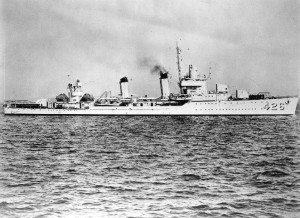

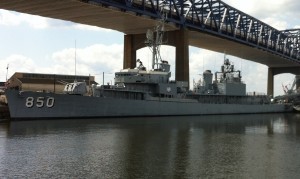
Bow to Stern
Let’s scan the USS Cassin Young from bow to stern. At the bow, we can see the anchor and the union jack (the flag with white stars on a blue background). Next we see the forward 5-inch guns in front of the bridge. The bridge superstructure contains the pilothouse and the captain’s emergency cabin, with the signal deck on top of the pilothouse, then the fire director, and several types of radar antennae on the mast.

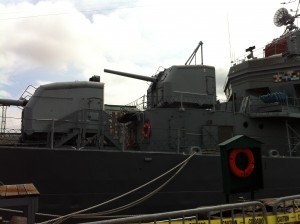
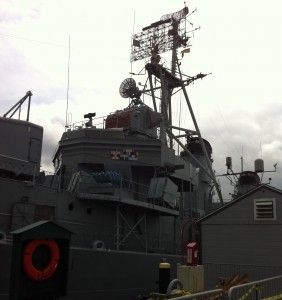
Aft of the bridge are the two funnels or stacks leading from the dual boiler (fire) rooms below, and the torpedo tubes (on the Gleaves-class destroyers, the torpedo tubes sat between the stacks). Past the quarterdeck sit the three aft 5-inch guns (there were usually only two on the prewar destroyers), antiaircraft guns, and depth-charge racks on the stern.
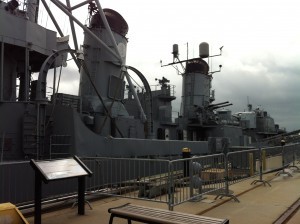
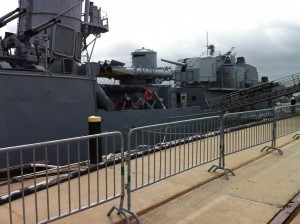
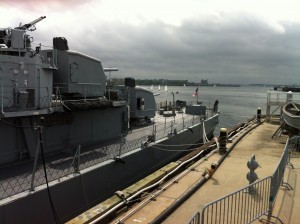
Topside Tour
Come aboard! Pictures are taken on both the Cassin Young and the Joseph P. Kennedy Jr. Up at the bow, we can see the anchor chains and the 5-inch guns more closely. Throughout the ship, you’ll see lines neatly coiled and hatches with ladders leading below decks.
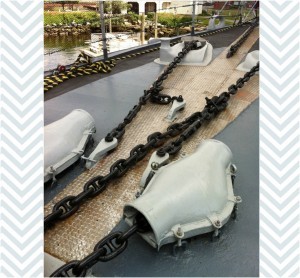
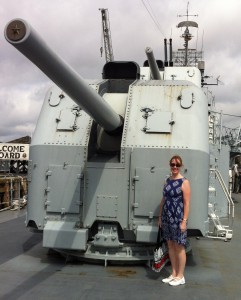
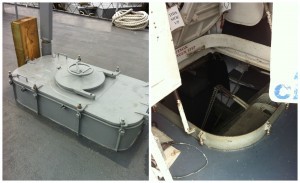
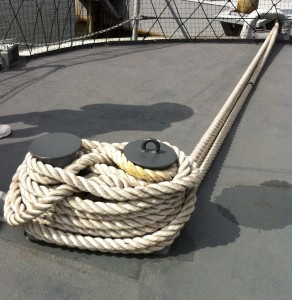
Alongside the bridge superstructure we can see the whaleboat, ready to rescue stranded sailors or airmen, or to take men to shore for liberty. Toward the stern we can see the torpedo tubes (and my humidity-exhausted son). The Cassin Young carried ten torpedoes in this mount, while the earlier classes usually had a quintuple mount.
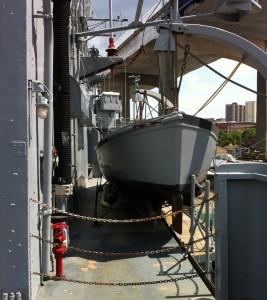
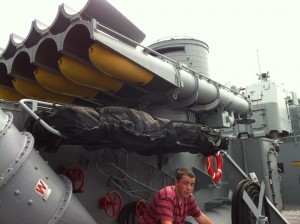
At the stern lie two depth charge racks, where explosives were rolled down to submarines below. Here we see the later model “teardrop” depth charge, while earlier in the war “ash can”-shaped depth charges were used. The ensign (US flag) flies proudly at the stern.

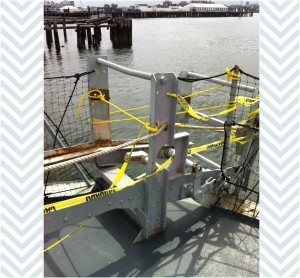
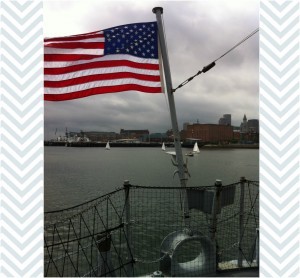
Come back Wednesday and go below decks to see how sailors lived and worked!
Sources:
McComb, Dave. US Destroyers 1934-45: Pre-War Classes. Oxford: Osprey Publishing, 2010.
McComb, Dave. US Destroyers 1942-45: Wartime Classes. Oxford: Osprey Publishing, 2010.
Wiper, Steve. Warship Pictorial: USS Buchanan DD-484. Tucson, AZ: Classic Warships Publishing, 2009.
Harmon, J. Scott. U.S.S. Cassin Young (DD-793): A Fletcher Class Destroyer. Missoula, MT: Pictorial Histories Publishing Company, 1984.
Friedman, Norman. U.S. Destroyers: An Illustrated Design History. Annapolis, MD: Naval Institute Press, 1982.
Boston National Historical Park: USS Cassin Young. http://www.nps.gov/bost/learn/historyculture/usscassinyoung.htm
Destroyer History Foundation website. http://www.destroyerhistory.org
Tin Can Sailors Website. http://www.destroyers.org/index.html
 Giveaway
GiveawayI’m giving away this vintage Through Waters Deep apron, made by my talented author-buddy Marci Seither, and modeled by her lovely daughter! To enter, leave a comment below (US & Canada only please), on last week’s Tour of Boston, Part 5 article, or on Wednesday’s Destroyer Tour post. You can earn a maximum of three entries by leaving a comment on each of the three posts. If you can’t leave a comment, please send me an email to enter. Giveaway ends Wednesday, August 5, 2015 at midnight, Pacific Time. I’ll announce the winner here on Friday, August 7, 2015.



